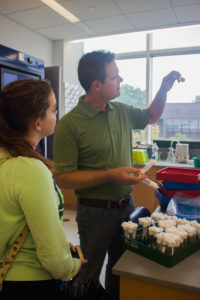
CAMRY DEAN
Staff Writer
In 2012, professor Scott Ferguson of the Biology Department was awarded a grant from the National Science Foundation for his research project, “Genetic Analysis of Gurken Translational Control.”
The $250,000 grant, the largest ever awarded to a Fredonia Biology faculty member, has helped Ferguson make advances in his research of figuring out how humans develop disease.
Using fruit flies, Ferguson has been studying detailed molecular switches that control production of growth.
“It’s a model organism that we use because they can make lots of progeny really quick, but there’s also a lot of sophisticated genetic tools,” he said. “When we talk about using these tools, we can manipulate the structure of the fly’s genomes to be able to test certain ideas we have about how the genes are functioning, how the cell responds to its environment and how it grows and develops.
“The questions that we’re asking in terms of what’s going on in the fly have to do with how the fly develops so we study oogenesis, as the flies are making eggs,” Ferguson said.
In fruit flies, you can study their oogenesis, which is the development of the egg. Specifically, Ferguson focuses on a protein known as Gurken.
Gurken, which is considered a Transforming Growth Factor (TGF) in humans, is localized only on one side of the egg, where it’s absent on the other. When Gurken is present, the female egg will develop normally. If it isn’t present, the developing female egg will be non-functioning.
By understanding oogenesis and Gurken’s role, Ferguson hopes to determine the link between diseases and their treatment because of the similarities in the TGF in humans.
“If you study how [ribonucleic acid] gets converted to protein in the fly, the idea is that you can also understand how that happens in people,” said Ferguson. “If you can understand how that happens, ideally you could make a drug that could block the translation of that growth factor in humans.”
Merit and broader impacts are two key concepts that the NSF looks for when evaluating a grant. With only four out of 35 of the last grant applications being accepted by the NSF, Ferguson believes integrating his research and his classes helped set him apart from the rest.
“I think one of the challenges in an environment like Fredonia, where teaching is a big job, is that your research might suffer, or if you put your emphasis on your research, then your teaching suffers because it’s not where your attention is,” Ferguson said. “I’m not going to do that; I’m going to blend the two together.”
This semester, Ferguson is teaching a sophomore-level genetics lab that has about 80 students. When teaching a lab, Ferguson believes teaching ongoing research in place of taught research that has already been concluded benefits his students because it gives them an opportunity to break new ground and feel like an actual scientist.
“I don’t know the answer when we start, and that’s really unnerving for them,” said Ferguson. “They need to be okay with being wrong. That’s part of science and its part of life in general.
“Fredonia is the most fertile ground for broader impacts. Broader impacts is how the intellectual merit affects society. I’m affecting 80 students in a genetics lab every Fall, training the next generation of scientists,” said Ferguson.
A Fredonia alumni and previous student of Ferguson’s, who is currently at the Carnegie Mellon University in Pittsburgh for his Ph.D, was able to skip an entire year of classes because of the training he received at Fredonia. With students studying at UC Berkeley and Cornell, as well as with research positions at Roswell Park Cancer Institute, it’s obvious this method works.
“You’re getting a Princeton education at a Fredonia State price,” Ferguson said.
Only four years after being awarded his 2012 NFS grant, Ferguson is currently getting ready to submit his next grant proposal in November.
The Office of Sponsored Programs, located in Thompson Hall, works with research activities and programs funded by sources other than SUNY and Fredonia, and has created a video series called “Granted” to try and encourage other faculty to work on their own research and submit grants.
“Just like we try to recruit students to come to Fredonia, they try to recruit other faculty to write grants, as well,” Ferguson said.
In a short video titled “Come Fly with Me,” Ferguson explains his research and his grant from the Research in Undergraduate Institutions.
The Office of Sponsored Programs and Ferguson hope that this exposure will encourage faculty to submit, as well as generate interest both current and prospective Fredonia students.
“To get the word out about what we’re doing is important. I love to read about what’s happening in theatre and dance, as well as the music school. It can’t be a bad thing to let people know what’s happening on campus,” said Ferguson.
